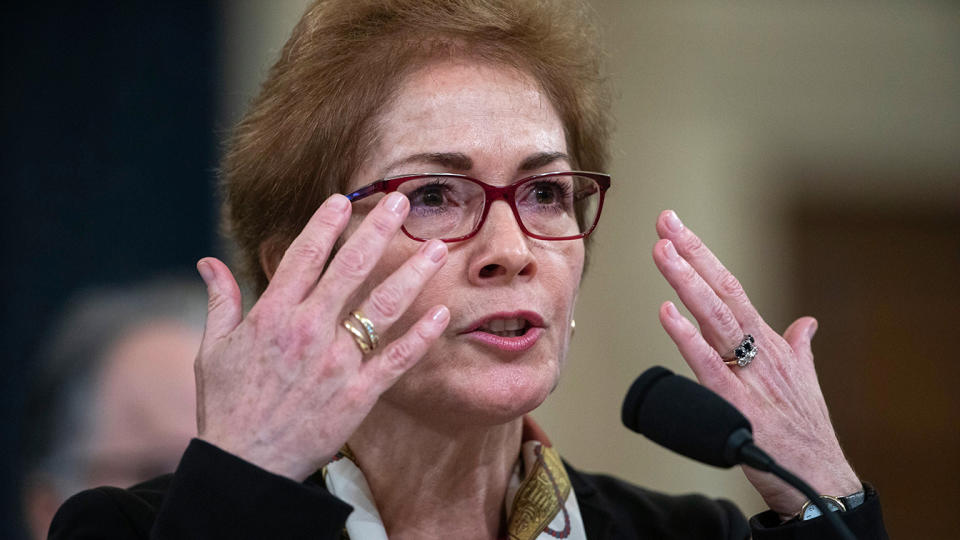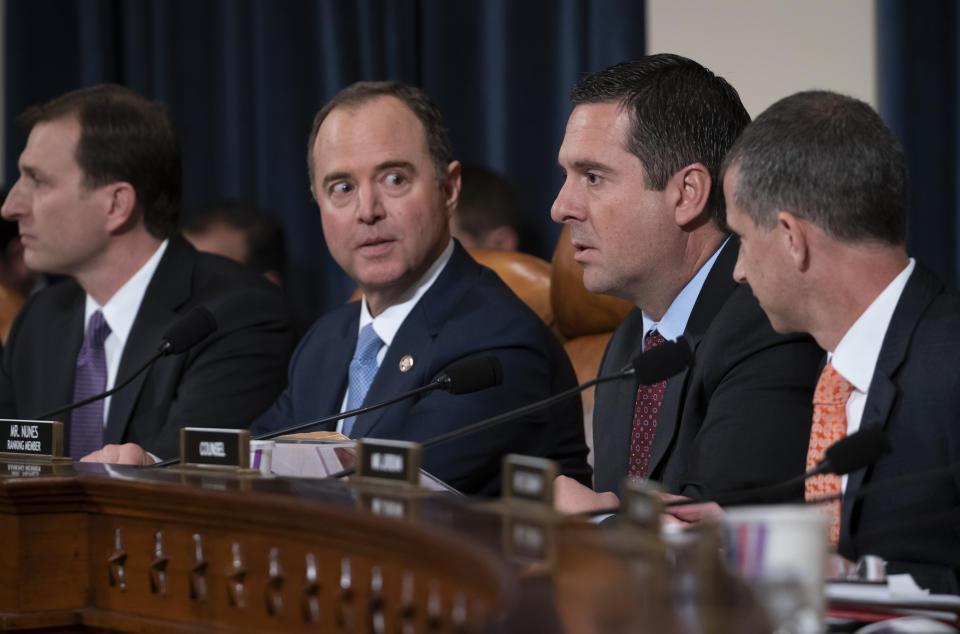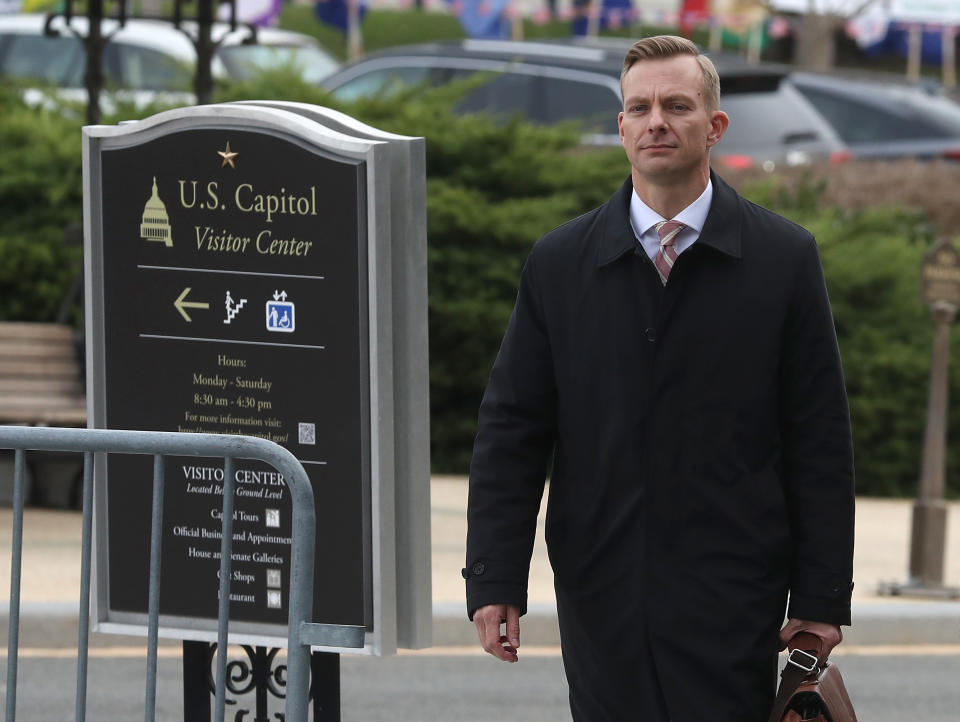Trump impeachment hearings: 3 key takeaways from Yovanovitch's testimony
- Oops!Something went wrong.Please try again later.
The impeachment investigation into President Trump continued Friday with testimony from Marie Yovanovitch, the former ambassador to Ukraine who Trump recalled earlier this year. Yovanovitch is a longtime diplomat, having been appointed by President George W. Bush as ambassador to Kyrgyzstan and then Armenia and as ambassador to Ukraine by President Barack Obama. Although Yovanovitch didn’t have direct knowledge of Trump’s phone calls with Ukrainian President Volodymyr Zelensky, she was firm in her belief that Trump’s pressuring of Zelensky for investigations that would benefit his reelection campaign was improper. Her testimony drew Trump’s ire in a way Wednesday’s testimony did not.
Witness intimidation during testimony
Roughly an hour into Friday morning’s hearing, Trump went after Yovanovitch on Twitter.
“Everywhere Marie Yovanovitch went turned bad,” wrote Trump. “She started off in Somalia, how did that go? Then fast forward to Ukraine, where the new Ukrainian President spoke unfavorably about her in my second phone call with him. It is a U.S. President’s absolute right to appoint ambassadors.”
As a foreign service officer, Yovanovitch was posted in Somalia early in her career, at a period when the East African nation was in turmoil from a civil war that began in 1991. House Intelligence Committee Chairman Adam Schiff, D-Calif., read the tweet to the former ambassador during her testimony and gave her an opportunity to respond.
“I don’t think I have such powers, not in Mogadishu, Somalia, and not in other places,” Yovanovitch said. “I actually think that where I’ve served over the years, I and others have demonstrably made things better for the U.S. as well as for the countries that I’ve served in.
“Ukraine, for example, where there are huge challenges, including on the issue that we’re discussing today of corruption, huge challenges, but they’ve made a lot of progress since 2014, including in the years that I was there,” she added. “I think, in part, I mean the Ukrainian people get the most credit for that, but a part of that credit goes to the work of the United States and to me as the ambassador in Ukraine.”

“We saw today witness intimidation in real time by the president of the United States,” Schiff told reporters during a hearing recess. “Once again going after this dedicated and respected career public servant in an effort not only to chill her but to chill others who may come forward. We take this kind of witness intimidation and obstruction of inquiry very seriously.”
“Expect witness tampering to be an article of impeachment,” wrote Rep. Justin Amash, an independent from Michigan who left the Republican Party in July, in a retweet of Trump’s comments.
Rep. Liz Cheney, R-Wyo., a member of Republican leadership in the House, said the tweet “was wrong,” adding that Yovanovitch “clearly is somebody who’s been a public servant to the United States for decades and I don’t think the president should have done that.”
The White House denied Trump was engaging in intimidation.
“The tweet was not witness intimidation, it was simply the President’s opinion, which he is entitled to,” said press secretary Stephanie Grisham in a statement originally to NBC News. “This is not a trial, it is a partisan political process — or to put it more accurately, a totally illegitimate, charade stacked against the President. There is less due process in this hearing than any such event in the history of our country. It’s a true disgrace.”
Trump disparaged Yovanovitch in a July 25 phone call with Zelensky, referring to her as “the woman” and saying, “She’s going to go through some things,” according to a memo on the call released by the White House. Yovanovitch explained Friday how the revelation of that transcript affected her.
“I was shocked, absolutely shocked, and devastated, frankly,” Yovanovitch said. “I was shocked and devastated that I would feature in a phone call between two heads of state in such a manner, where President Trump said that I was ‘bad news’ to another head of state.
“A person who saw me reading the transcript said that the color drained from my face, I think I even had a physical reaction,” she added. “Even now words kind of fail me.”
A ‘chilling effect’ and a Georgetown post

During her testimony, Yovanovitch put forth an impassioned defense of U.S. foreign service personnel and said that her removal had a “chilling effect” on her colleagues because they would now be unsure if the administration would back them in implementing U.S. policy where it might conflict with the personal interests of the president or his allies.
“Our Ukraine policy has been thrown into disarray, and shady interests the world over have learned how little it takes to remove an American ambassador who does not give them what they want,” said Yovanovitch during her opening statement. “After these events, what foreign official, corrupt or not, could be blamed for wondering whether the ambassador represents the president’s views? And what U.S. ambassador could be blamed for harboring the fear that they cannot count on our government to support them as they implement stated U.S. policy and defend U.S. interests?”
Republicans attempted to minimize the impact of Trump recalling Yovanovitch from her post. They emphasized that ambassadors serve at the pleasure of the president and pointed out that Yovanovitch still enjoyed the support of her colleagues and kept her foreign service rank and salary while serving a fellowship at Georgetown University. But she also had been the object of attacks by numerous Trump allies, including his personal attorney Rudy Giuliani, his son Donald Trump Jr. and Fox News host Sean Hannity.
“Why was it necessary to smear my reputation?” she asked.
Rep. Mike Quigley, D-Ill., later joked about the Republican line of argument, saying, “It’s like a Hallmark movie! You ended up at Georgetown, it’s all OK!”
GOP tactics

Ranking member Devin Nunes, R-Calif., used part of his opening statement to read a memo on Trump’s first call with Zelensky, which the White House released just before testimony began. While the edited transcript didn’t include Trump asking for an investigation, it did show Zelensky asking Trump to attend his inauguration and Trump referencing his time running Miss Universe. The original summary of the call released by the White House shortly after it took place in April said Trump urged Zelensky to fight corruption, but the White House memo released Friday morning did not.
Nunes mocked the witness, a tactic he also used against the first two public witnesses on Wednesday, saying, “Ambassador, I congratulate you, you’ve been down in the secret deposition meeting rooms. You’ve graduated for your performance today.”
After recess for a House vote, Nunes was given 45 minutes to speak and to question Yovanovitch. When he tried to yield some of his time to another Republican, Rep. Elise Stefanik of New York, Schiff ruled the move out of order; according to the rules established in advance, only the top Democrat and Republican, and their respective staff counsels, could use that block of time. Schiff’s ruling was portrayed in some right-wing media as “gagging” Stefanik, the only woman among the Republican Intelligence Committee members.
The Republicans also pursued their effort to unmask the anonymous whistleblower whose complaint inspired the inquiry. Democrats have said they want to protect the person’s identity, in part because his or her lawyer told Yahoo News the person has been receiving death threats. Schiff has also said that the whistleblower’s appearance is probably unnecessary, since other witnesses have covered the same events in their testimony. Rep. Mike Turner, R-Ohio, jabbed at Schiff by entering a number of September articles about how the chairman had said the whistleblower would likely testify soon. Later, Stefanik used her allotted time to read quotes from Schiff talking about the whistleblower potentially testifying. In response, Rep. Eric Swalwell, D-Calif., read quotes from Trump comparing the source of the original information about his phone call to a spy and suggesting that he or she should be executed like “we used to do in the old days.”
What’s next

David Holmes — the State Department aide who overheard Gordon Sondland, U.S. ambassador to the European Union, talking to Trump during a phone call in a restaurant in Kyiv — is testifying behind closed doors in the impeachment inquiry Friday. Mark Sandy, the deputy associate director of the Office of Management and Budget, a White House agency that coordinates federal government spending, is due to testify in private on Saturday.
Public hearings continue next week, with testimony scheduled for Tuesday, Wednesday and Thursday.
Tuesday, Nov. 19: Jennifer Williams, Vice President Mike Pence’s special adviser on European and Russian affairs; Lt. Col. Alexander Vindman, Ukraine expert on the White House’s National Security Council; Kurt Volker, former U.S. special envoy to Ukraine; and Tim Morrison, former senior director for European affairs on the National Security Council.
Wednesday, Nov. 20: Gordon Sondland, U.S. ambassador to the European Union; Laura Cooper, a top Pentagon official with oversight into Ukraine policy; and David Hale, U.S. under secretary of state for political affairs.
Thursday, Nov. 21: Fiona Hill, a former National Security Council official.
_____
Download the Yahoo News app to customize your experience.
Read more from Yahoo News:




